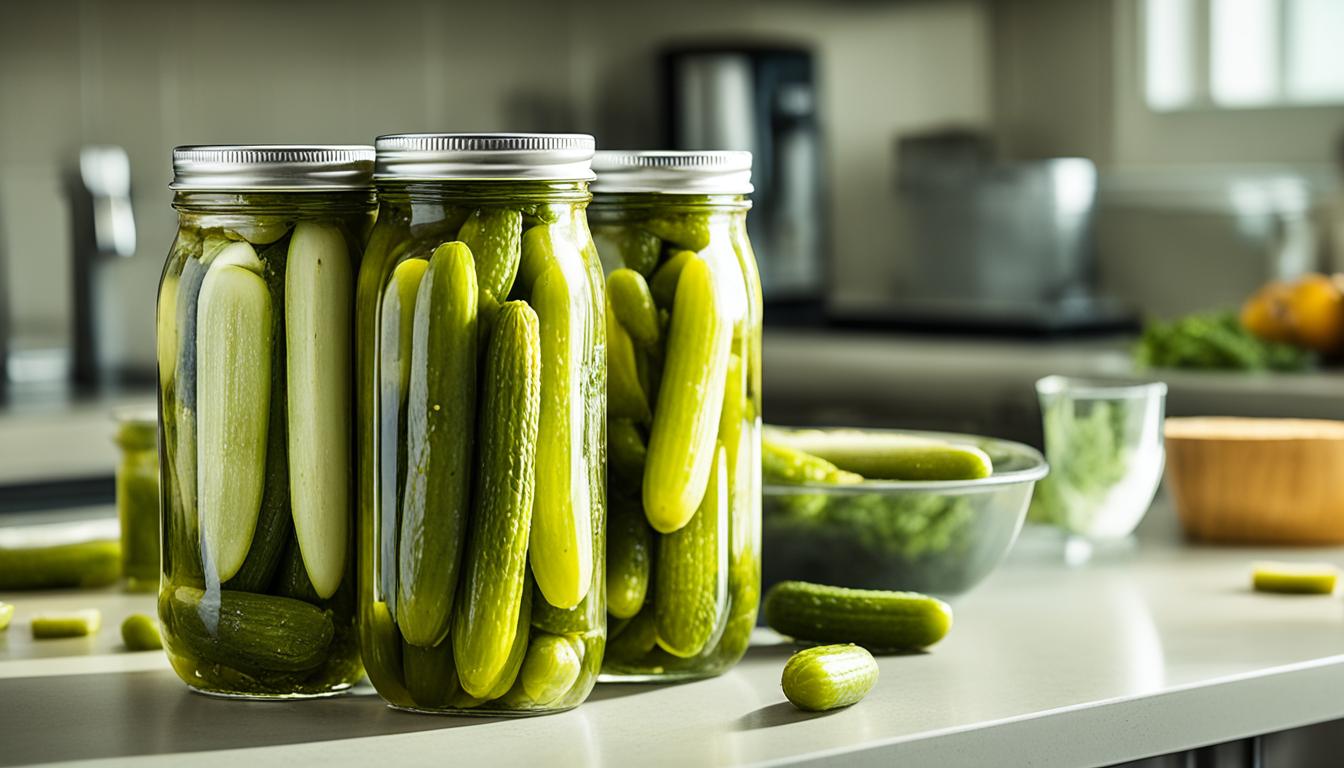Do you love the taste of pickles? Whether you prefer tangy dill or sweet kinds, it’s good to know how long they last. This will help you enjoy them when they’re best. Let’s look into how long pickles stay fresh and tips to keep them that way.
Key Takeaways:
- Pickles can last for varying lengths of time depending on storage conditions.
- Homemade refrigerated pickles can last three to four weeks, while commercially packed refrigerated pickles can last up to 75 days.
- Visible signs of spoilage include changes in color, texture, and odor, as well as visible mold.
- Good pickle jar hygiene and storing pickles in the fridge at 40°F or colder can help prevent spoilage.
- Proper storage, cleanliness, and awareness of spoilage signs are key to preserving pickle freshness.
How Long Do Refrigerator Pickles Last?
Refrigerator pickles are a great choice for an easy, tasty snack. They’re simple to make and have a tangy flavor. But, you might wonder how long they stay good.
The longevity of refrigerator pickles varies by a few things. Typically, homemade refrigerated pickles last about three to four weeks in the fridge. After that, their quality might begin to drop.
When checking your pickles, note the brine clarity and pickle texture. Over time, the brine could get murky, and the pickles might soften. They could still be okay to eat, but might not taste as good.
To keep your pickles fresh longer, start with clean jars. Boiling the brine before adding it to the veggies helps too. Also, using firm veggies like cucumbers and radishes makes your pickles last longer.
Preserving the Quality of Refrigerator Pickles
Want your refrigerator pickles to remain crisp and fresh? Here are some tips:
- Keep them cool at 40°F or colder to avoid spoilage.
- Make sure the pickles are always covered in brine to keep them fresh.
- Check the jars often for spoilage signs like mold or bad smells.
- Mark the jars with the prep date to track how fresh they are.
With these tips, you can enjoy crunchy, tasty refrigerator pickles longer.
Commercially Packed Refrigerator Pickles
Refrigerator pickles are very popular because they are easy to store and last long. Grillo’s Pickles, a big name, sells these types of pickles. They stay fresh for up to 75 days in the fridge after they’re made.
These pickles don’t need extra steps to keep them fresh. They are always kept cold, from shipping to selling. This means you get fresh and crispy pickles without much work.
Yet, it’s best to eat them in the first two to three weeks. This is when they taste the best. Grillo’s Pickles are most enjoyable during this time.
Watch out for bulging lids though. They mean the pickles might have gone bad. This happens if they’re not kept cold. Always store your pickles in the fridge to avoid any problems.
Shelf Life of Commercially Packed Refrigerator Pickles (Grillo’s Pickles)
| Storage | Shelf Life |
|---|---|
| Refrigerator (40°F or colder) | Up to 75 days |
Signs of Spoiled Pickles
Pickles are a popular snack and often added to many meals. But it’s key to know when they’re not safe to eat. Here are some signs that your pickles might be spoiled:
- Changes in color: Spoiled pickles might look different than when they were fresh. Cucumber pickles, for instance, could turn darker or even brown.
- Changes in texture: A soft or mushy texture is a sign your pickles could be bad. If they’re too squishy or not crisp, they’re likely spoiled.
- Unpleasant odor: Bad brine smells foul. If your pickles smell weird or sour, throw them out.
- Cloudy brine: Cloudy or murky brine can show microbial growth. This spoiled brine may have harmful bacteria or yeast.
- Mold formation: Seeing mold or fungal growth means the pickles are spoiled. Any pickles with mold should be tossed for your health’s sake.
- Fizzy brine: A little fizz in some fermented pickles like kimchi or sauerkraut is normal. But if your pickles aren’t meant to ferment and the brine fizzes, they’re spoiled.
- Bulging lid: A jar lid that’s bulging signals spoilage. Be careful and don’t eat pickles from jars with swollen lids.
Eating spoiled pickles can make you sick, causing stomach problems, diarrhea, and vomiting. To stay safe and enjoy your pickles, always check for these spoilage signs before eating.
Here’s a table that helps summarize the signs of spoiled pickles:
| Signs of Spoiled Pickles | Description |
|---|---|
| Changes in color | Discoloration, such as turning darker or brown |
| Changes in texture | Soft or mushy pickles |
| Unpleasant odor | Off-putting or sour smell |
| Cloudy brine | Murky or cloudy brine |
| Mold formation | Fuzzy patches or discoloration on pickles or brine |
| Fizzy brine | Excessive fizziness in the brine |
| Bulging lid | Swollen or bulging lid on the pickle jar |
Preventing Pickle Spoilage
Keeping pickles fresh and tasty is simple if you follow some key steps. By taking care of how you store your pickles, they can last longer. These tips will help you keep your pickles from going bad and maintain their flavor.
Choose the Right Recipe
Choosing the right recipe is vital when making pickles at home. Look for recipes with a good water-to-vinegar mix and 5% acidity. This stops bacteria from growing and keeps the pickles safe to eat. Using trusted recipes means your pickles will taste great and stay fresh longer.
Fill Jars Completely and Keep Them Tightly Shut
To store pickles well, fill jars all the way with brine. This keeps out harmful bacteria. Make sure the jars are shut tight to keep air out. This will help your pickles stay fresh.
Maintain Cleanliness and Good Hygiene
Keeping jars clean is important to stop your pickles from spoiling. Make sure the jar rims are clean and free of spices or pickle bits. Always use clean hands or utensils to handle your pickles. This keeps away bacteria that could spoil them.
Store Pickles at the Right Temperature
Storing pickles at the right temperature is key. Keep refrigerator pickles at 40°F or below. This temperature stops bacteria from growing, keeping your pickles fresh. Check your fridge’s temperature often to make sure it’s right for your pickles.
Follow these tips to keep your pickles from spoiling. Pick the right recipes, fill jars properly, keep things clean, and store them cool. By doing this, your pickles will stay crisp and tasty for a long time.
Pickles and Food Safety
Concerns about the longevity and quality of pickles are common. But, food-borne illnesses from commercially packed pickles have been rare in the U.S. over the last 50 years.
Keeping pickles safe involves proper storage and mindful handling. By adhering to storage guidelines and spotting spoilage early, you can keep your pickles safe.
“Proper storage and handling of pickles play a crucial role in preventing spoilage and maintaining their safety.”
Grillo’s Pickles, like other commercial brands, focus on food safety from production to shipment. Store these pickles in the fridge for the best taste. They are best eaten within two to three weeks.
Safe pickle keeping at home requires good jar hygiene. Make sure jars are sealed and kept cold at 40°F or less. Always look for spoilage signs like color changes, bad smells, or mold.
To enjoy pickles without worry, prioritize clean storage, hygiene, and stay alert for spoilage.
Pickles and Food Safety Tips:
- Keep commercially packed pickles chilled. Eat them within the suggested time.
- Ensure jars are sealed well and stored at 40°F or less.
- Watch for spoilage signs like odd colors, textures, scents, or mold.
| Pickles and Food Safety | Summary |
|---|---|
| Commercially packed pickles safety | Rare occurrences of food-borne illnesses in the past 50 years |
| Proper storage and handling | Prevent pickle spoilage and maintain safety |
| Home storage guidelines | Seal jars correctly, refrigerate at 40°F or colder, look out for signs of spoilage |
Pickle Shelf Life and Storage Tips
Storing pickles right keeps them fresh and tasty. Here’s how to keep your pickles good for longer:
Refrigeration
Keep unopened pickle jars in the fridge for up to a year. Once you open them, eat them within three months for the best flavor.
For opened jars, seal them tight before putting them back in the fridge. This stops air from getting in and spoiling them.
Submerging in Brine
Keep all your pickles, whether homemade or bought, under the brine. This keeps them in a safe zone and makes them last longer.
Pantry Storage
Pickles can stay in the pantry for a bit. But they won’t keep as long as in the fridge or freezer.
Freezing Pickles
Freezing is a way to keep pickles for a long time, but they might get a bit softer.
Label your frozen pickles with the date. This helps you know how fresh they are and when to use them.
| Storage Method | Shelf Life |
|---|---|
| Refrigeration (unopened jars) | Up to 12 months |
| Refrigeration (opened jars) | Within 3 months |
| Pantry Storage | Short-term |
| Freezing | Long-term (with texture changes) |
By sealing jars well, keeping pickles soaked in brine, and chilling opened ones, your pickles will stay fresh longer. These tips will help you enjoy your pickles more.
Reusing Pickle Brine
Don’t toss that leftover pickle brine! It’s perfect for creative uses in the kitchen, adding zest to dishes. A cool use is making pickle juice pops. These are refreshing and a smart reuse of brine.
But, freezing pickles in the brine can change their texture. They may become clear and soft. Try other ways to use pickle brine in your cooking instead.
Here’s how to get creative:
- Marinade meats or tofu with pickle brine for a tangy taste.
- Boost salad dressings or sauces by adding some brine.
- Mix pickle brine into cocktails for a zesty twist.
- Swap vinegar with pickle brine in coleslaw or potato salad recipes.
When reusing brine, make sure it’s within its safe storage time. Explore and try new recipes using pickle brine!
Creative Uses for Pickle Brine
| Usage | Description |
|---|---|
| Marinade | Marinate meats or tofu in pickle brine for flavorful zest. |
| Salad Dressings | Boost your dressings and sauces with some brine for extra flavor. |
| Cocktails | Create zesty cocktails by adding pickle brine. |
| Recipe Substitute | Use pickle brine instead of vinegar in dishes like coleslaw or potato salad. |
Pickles and Expiration Dates
Unopened pickle jars last for a long time when kept in the fridge. The type of ingredients matter, though. But when you open it, try to eat the pickles in three months for the best taste. Although old pickles may not make you sick if you’ve stored them right, they might not taste as good.
Expiration dates on pickle jars are more like guidelines than strict rules. They tell you when the taste is best. Since pickles sit in brine, they stay good longer. But after a while, their quality can drop.
Proper storage makes pickles stay fresh. Always keep them cold, under 40°F, in your fridge. This stops bacteria from growing fast. And it keeps the pickles tasting great.
Consuming expired pickles
Eating pickles after their expiration date can be okay. But you should look them over well first. Check for changes in color, smell, taste, or softness. If something seems off, don’t eat them.
Pickles that touch air or aren’t stored right go bad quicker. So, always make sure the jar is closed tight. Wipe off any spice or pickle bits from the jar’s edge before you close it up again.
“Consuming pickles past their expiration dates may not necessarily pose food safety concerns if stored properly, but the taste and quality may not be up to par.”
Eat your pickles soon after opening the jar to enjoy their best flavor. Pickles add zing to sandwiches and salads. Watching their dates and keeping them stored right means you’ll enjoy every bite.
Spotting Spoilage and Quality
Knowing how to spot a bad pickle is key to a good experience. Look out for changes in color, taste, smell, and texture to enjoy every bite. Whether homemade or store-bought, these tips will guide you in identifying bad pickles and assessing their quality:
Changes in Color
Watch for any weird color changes in your pickles. A bright, even color means they’re fresh. But, if they turn yellowish or brown, they might be bad.
Taste and Smell
Use your senses to test pickles. A good pickle should taste tangy and crisp. A bad one might taste weird or smell foul. If something smells or tastes off, it’s safer to throw the pickle away.
Texture
The texture of a pickle is crucial for its quality. It should be firm and crunchy. If it’s mushy or slimy, it’s spoiled and shouldn’t be eaten.
“A clear jar can be your best ally in spotting signs of spoilage.”
Watch for spoilage signs to avoid bad pickles. Clear jars are helpful in checking pickles without opening them. Discard the pickle if you see discoloration, smell something bad, or if the texture is off.
| Signs of Spoilage | Pickle Quality |
|---|---|
| – Changes in color | – Vibrant and consistent color |
| – Off taste or bad odor | – Tangy and crisp taste |
| – Mushy or slimy texture | – Firm and crunchy texture |
Avoiding spoiled pickles is important to prevent foodborne illnesses. By trusting your senses and following these tips, you can enjoy high-quality, fresh pickles.
Conclusion
Pickles are both yummy and versatile. They can make your meals both tasty and crunchy. You can enjoy homemade pickles for up to four weeks or store-bought ones for about 75 days.
To keep your pickles fresh, always use clean utensils and close the jars tightly. Watch for signs of spoilage like changes in color, texture, and smell. If the pickles look or smell odd, it’s best to throw them away.
Good storage and care are key to enjoying pickles. Follow these tips and you can enjoy the great taste of pickles anytime.





